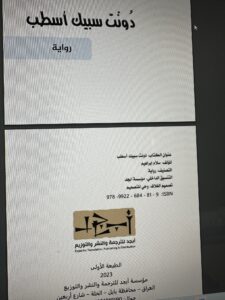
With this new novel of 444 pages, and thirty chapters, Salam surpasses all the cultural taboos known in the Arab-Islamic world. Narrating in details his early years of adolescence, the secret relations with neighbors, whether boys or girls, the adventurous life of daring narrative that approached fiction in its fantasies, remembered when he reached sixty seven years old, is a brave & courageous attempt, culminating a series of novels & novellas (12 in numbers) that depicted his life, as a child, a revolutionary, a disappointed vagabond, a soldier, a lover, a thief stealing from neighbors’ gardens, or as a voyeur at newly married couples, a passionate lover of his father & mother- although punished severely by them for his behavior , who died without his ability to see them, & tens of episodes documenting his experiences in prisons, on mountains, in exile, in hospitals: an autobiography that is rare as a genre in the Arab region. Writers in the west payed huge price when writing about such forbidden subjects, as Flaubert’s “Madame Bovary” written in 1856 & the storm of critics he faced by public prosecutors who attacked the novel for obscenity. Before his death, Edward Said as well faced critique from family when he wrote his biography “Out of Place” because of few sentences touching upon “taboos” among the family. Although novelists in the west became accustomed to hundreds of stories about the ancient sexual taboos, this genre of books is still among the most forbidden nowadays in 2023, especially in Iraq where the novel is published.
With this novel, with the only sentence that is repeated by his father when he refused to discuss any thing further issues with his wife or the family: Don’t Speak Stop: دُونْت سبيك أسطب Salam showed the harsh naked realities of the majority of silent people, not only in Iraq, but in all the region as well.
